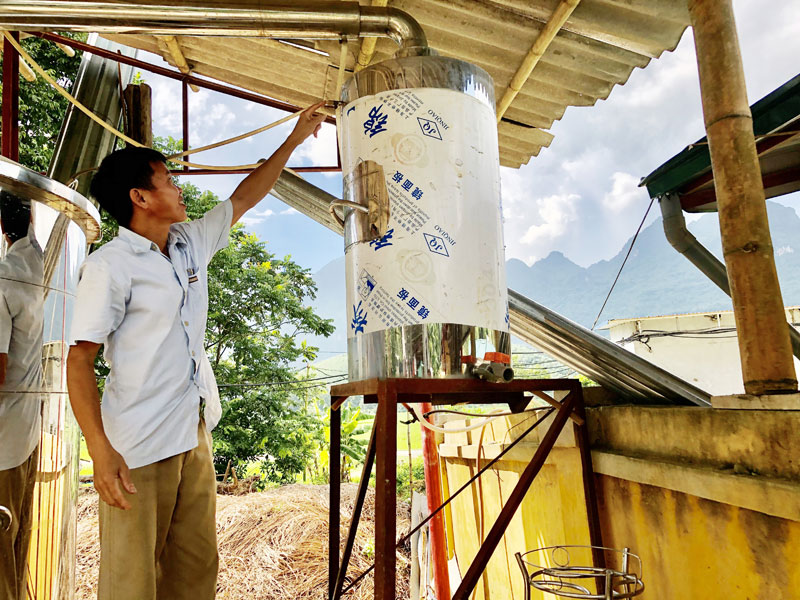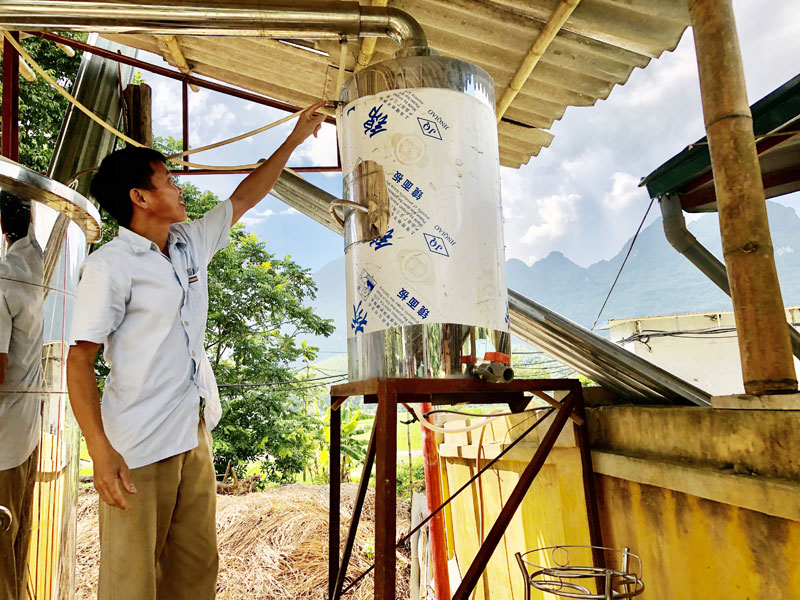
(HBO) – The Huy Chi service cooperative in Chi Bai village, Hung Son commune, Kim Boi district, has applied science and technology to produce lemongrass essential oil with the distillation method.
Huy Chi cooperative’s lemongrass essential oil in Chi Bai village, Hung Son commune, Kim Boi district, is made with modern distillers, ensuring hygiene.
The product has various uses, including repelling mosquito
and insects, deodorising, and reducing stress. In 2020, the cooperative’s product registered
for the One Commune-One Product (OCOP) Programme at the provincial level.
The lemongrass plants have been cultivated in Ba Bi village,
Hung Son commune since 2003. The weather and land in the locality is suitable for
the growth of the plant. Recognising the shortage in supply, while the economic
value of the plant is five times higher than that of rice cultivation on the
same area, the Party Committee and administration of Hung Son commune have
defined lemongrass as one of the major farm produce of the locality. So far,
the commune has had more than 48 hectares of lemongrass, mostly in Ba Bi
village.
A 1,500-litre cooker can process 500 kilos of raw lemongrass
to extract 1.5 litre of oil. Extracted lemongrass leaves are used as cow’s feed
or fertilisers. The price of a 10ml lemongrass oil bottle is 50,000 VND
(2.15 USD). The product has been ready to take part in the OCOP Programme in
2020. It has received barcodes, labels and certificate of food safety.
Nguyen Khac Thanh, Chairman of the People’s Committee of
Hung Son commune, said that the commune’s Party Committee and Huy Chi
cooperative have worked hard to complete the product for the OCOP Programme in
2020. Once recognised as a OCOP product at the provincial level, Hung Son
lemongrass growers will get a chance to improve their income and living
conditions, thus encouraging them to give more capital and technical investment
to lemongrass farms and expand the farm areas.
Being marked with OCOP stars will also help the product to
enhance its value and affirm its trademark
as well as
position, he added./.
According to data from the Hoa Binh Provincial Party Committee, the industrial production index for the first six months of 2025 is estimated to have increased by 20% compared to the same period last year. This marks the highest year-on-year growth rate for this period since 2020.
In the first six months of 2025, Hoa Binh province’s export turnover was estimated at 1.145 billion USD, marking an 18.11% increase compared to the same period in 2024. Import turnover was estimated at $ 804 million, a 17.15% increase, which helped the province maintain a positive trade balance.
The lives of the ethnic minority farmers in Tan Lac district have gradually improved thanks to the new directions in agricultural production. This is a testament to the collective strength fostered through the professional associations and groups implemented by various levels of the district’s Farmers’ Union.
With the motto the "product quality comes first,” after nearly one year of establishment and operation, Muong village’s Clean Food Agricultural and Commercial Cooperative, located in Cau Hamlet, Hung Son Commune (Kim Boi district), has launched reputable, high-quality agricultural products to the market that are well-received by consumers. The products such as Muong village’s pork sausage, salt-cured chicken, and salt-cured pork hocks have gradually carved out a place in the market and they are on the path to obtaining the OCOP certification.
In the past, the phrase "bumper harvest, rock-bottom prices" was a familiar refrain for Vietnamese farmers engaged in fragmented, small-scale agriculture. But today, a new spirit is emerging across rural areas of Hoa Binh province - one of collaboration, organisation, and collective economic models that provide a stable foundation for production.
Maintaining growing area codes and packing facility codes in accordance with regulations is a mandatory requirement for agricultural products to be eligible for export. Recently, the Department of Agriculture and Environment of Hoa Binh province has intensified technical supervision of designated farming areas and packing facilities to safeguard the "green passport" that enables its products to access international markets.



